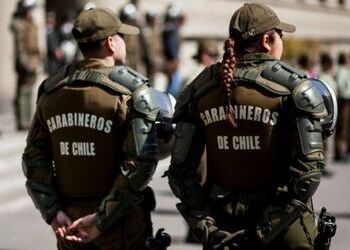Chile has given police greater leeway to use force against criminal suspects, but this hasty response to a wave of deadly attacks on security forces is unlikely to tackle the roots of the country’s security problems.
Several officers from Chile’s national police force, the Carabineros, have been killed or injured in recent weeks. In the latest incident, three officers were shot on April 12 during a security operation in La Florida, southeast of the capital, Santiago.
Before this, three others were killed in separate incidents in 23 days, culminating with the death of Daniel Palma, who was murdered during a traffic stop in central Santiago on April 5.
SEE ALSO: Northern Chile Struggling to Contain Skyrocketing Homicide Rate
In response, the government has rushed through new anti-crime legislation known collectively as the Naín-Retamal laws. These rules stiffen penalties for those who commit crimes against the Carabineros and grant the police privileged self-defense rights. When Carabineros use their weapons in self-defense, the law will assume that they have done so “according to professional principals,” said Interior Minister Carolina Tohá. However, investigations will be opened in suspicious cases.
“This [law] will allow us, together with other laws that have already been approved in the security agenda, to move forward with new tools to fight crime,” Senate President Juan Antonio Coloma said in a press release.
In 2022, Chile saw a startling 32% rise in homicides, with many concentrated in its northern region amid the arrival of the Venezuelan gang, the Tren de Aragua.
InSight Crime Analysis
While Chile’s security threat is palpable, empowering law enforcement risks sending the country down a road that leads to spiraling cycles of violence.
The move is broadly popular, with a recent survey showing 79% of respondents approve of the Carabineros. This is up from November 2021, when accusations of police brutality in response to widespread social protests saw the approval rate plummet to 45%.
“The public’s view has changed … because we are no longer talking about social causes behind the demonstrations. We are talking about very violent crime that does not respect age, sex, disabilities, or vulnerabilities,” Pilar Lizana, an investigator for the Chilean research center AthenaLab, told InSight Crime.
There have been acute concerns about the consequences of essentially giving carte blanche to the police. Dissenting legislators dubbed the new legislation the “easy trigger law,” while human rights groups have stated the changes give officers immunity when committing abuses. While supporting the law, even President Boric has called attention to a legacy of police brutality in Chile.
But one expert doubted whether the law would make a difference. The law was passed too hastily, and its potential impact was toned down during the legislative process, according to Claudio González Guarda, director of the Center for Citizen Security Studies at the University of Chile.
“In practical terms, it’s not much of a difference … it’s symbolic,” he said.
SEE ALSO: How Tren de Aragua Controls the Destiny of Migrants from Venezuela to Chile
Latin America provides cautionary tales about giving more power to the police. In Brazil, police have long been given massive leeway in countering criminality. Raids in favelas — poorer communities near cities — are often accompanied by excess force, for which few police officers are ever held responsible.
An infamous example of Brazilian police brutality came in 2021 when police raided the Jacarezinho neighborhood of Rio in pursuit of the Red Command (Comando Vermelho – CV) and killed 25 people. That year, Brazilian police murdered citizens at nine times the rate of their US counterparts, according to the LA Times, citing the think-tank Brazilian Forum on Public Safety.
In 2022, Latin America and the Caribbean accounted for eight out of the ten countries with the worst levels of police killings in the world, according to World Population Review.

